(AFP) — Spain’s prime minister vowed to “restore order” in the North African enclave of Ceuta on Tuesday after a record 6,000 migrants reached its beaches from Morocco, raising diplomatic tensions between Madrid and Rabat.
With the authorities in the tiny peninsula overwhelmed, Spain moved quickly to send them back, with 2,700 returned to Morocco by midday, the government said.
“We will restore order in the city and in our borders as soon as possible,” Prime Minister Pedro Sanchez said, adding that he would visit Ceuta and Melilla, Spain’s other north African enclave, later on Tuesday.
Most crossed into Ceuta largely unimpeded by Moroccan border guards on Monday, but by Tuesday morning, Rabat had deployed reinforcements at the Fnideq border crossing who fired tear gas to disperse the crowds eyeing a rare opportunity to slip across, an AFP correspondent reported.
The Moroccan government has been angered by Spain’s decision to provide medical treatment for the leader of the Western Sahara independence movement who has been seriously ill with Covid-19.
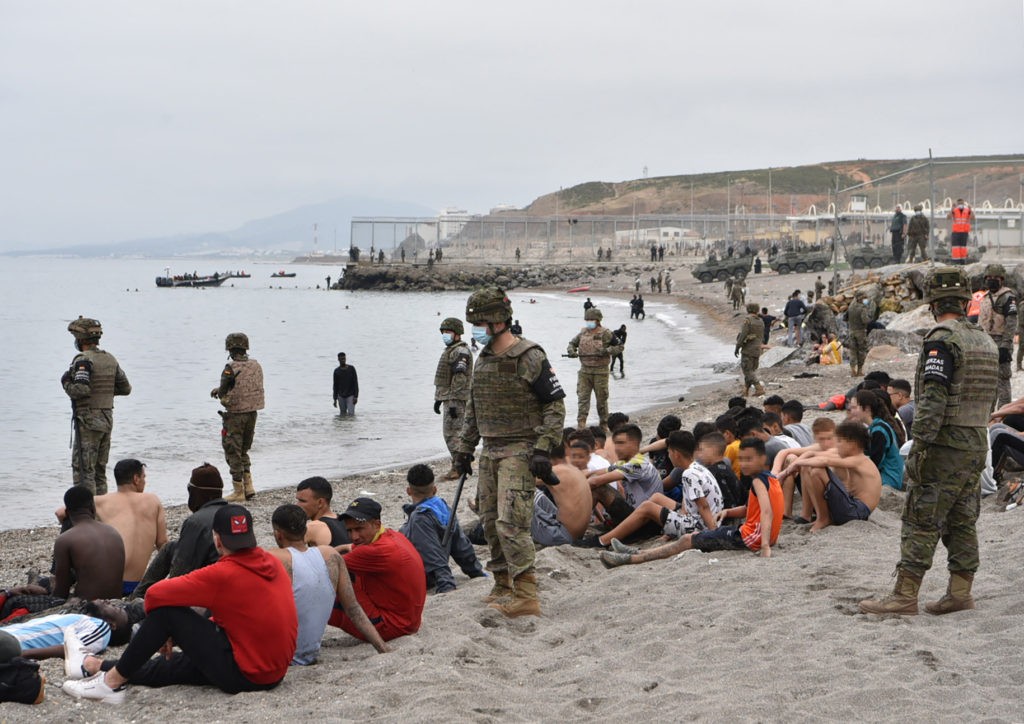
Migrants, including minors, who arrived swimming at the Spanish enclave of Ceuta, rest as Spanish soldiers stand guard on May 18, 2021 in Ceuta. – Spain has returned to Morocco nearly half of the 6,000 migrants who entered its Ceuta enclave, as hundreds more tried to enter its other north African territory. (Photo by Antonio Sempere / AFP) (Photo by ANTONIO SEMPERE/AFP via Getty Images)
Sanchez warned that the situation was a “serious crisis for Spain but also for Europe,” which is a destination of choice for people fleeing poverty and war in Africa.
It also prompted Sanchez to cancel a Tuesday trip to Paris where he was to attend an Africa financing summit.
The EU commissioner for home affairs, Ylva Johansson, urged Morocco to take action to stop the “worrying” increase, while European Council chief Charles Michel voiced solidarity with Madrid, tweeting “Spain’s borders are the European Union’s borders.”
By mid Tuesday, Spain quickly deployed another 200 police and Civil Guard officers to the scene.
“The situation is much calmer. The Moroccan authorities are blocking their nationals from coming along the beach,” a source at the Spanish government delegation in Ceuta told AFP, saying by midday (1000 GMT) the arrivals had stopped.
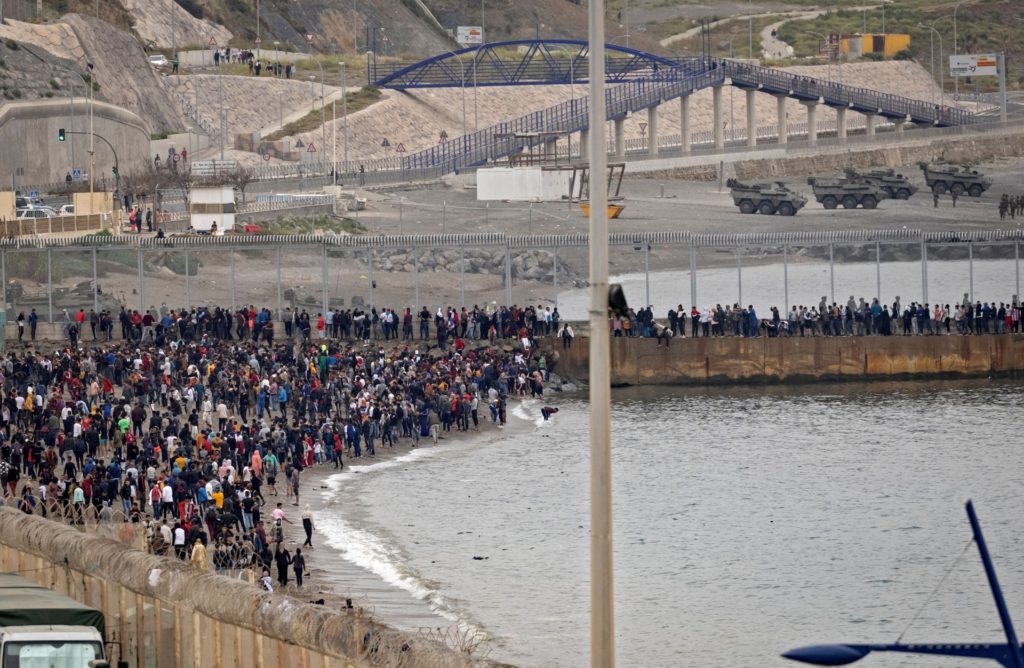
Moroccan migrants rally by a border fence in the northern town of Fnideq in an attempt to cross the border from Morocco to Spain’s North African enclave of Ceuta on May 18, 2021, while Spanish troops stand to intercept them on the other side. – At least 5,000 migrants, an unprecedented influx at a time of high tension between Madrid and Rabat, slipped into Ceuta on May 17, a record for a single day, Spanish authorities said. They reached the enclave by swimming or by walking at low tide from beaches a few kilometres to the south, some using inflatable swimming rings and rubber dinghies. (Photo by FADEL SENNA / AFP) (Photo by FADEL SENNA/AFP via Getty Images)
Amal, 18, said he had hurried to the Ceuta border with his brother and two friends in the hope of slipping into Spanish territory.
“Many of our friends managed to get across. We came later when we heard about it,” he said.
“We tried to climb over the mountain but the police blocked us.”
The migrants reached Ceuta by swimming or by walking at low tide from Moroccan beaches a few kilometres to the south. Some used inflatable swimming rings and rubber dinghies.
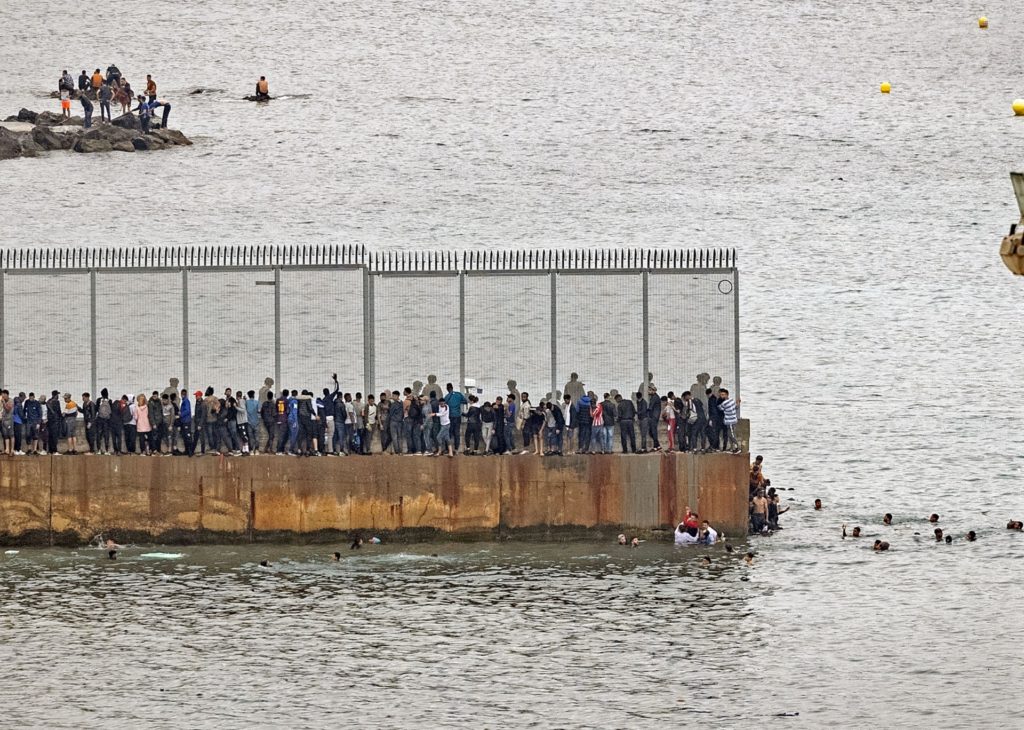
TOPSHOT – Moroccan migrants rally by a border fence in the northern town of Fnideq in an attempt to cross the border from Morocco to Spain’s North African enclave of Ceuta on May 18, 2021. – At least 5,000 migrants, an unprecedented influx at a time of high tension between Madrid and Rabat, slipped into Ceuta on May 17, a record for a single day, Spanish authorities said. They reached the enclave by swimming or by walking at low tide from beaches a few kilometres to the south, some using inflatable swimming rings and rubber dinghies. (Photo by FADEL SENNA / AFP) (Photo by FADEL SENNA/AFP via Getty Images)
In the early hours of Tuesday, hundreds more men and women of all ages flocked to the border to try their luck.
“I saw on Facebook that it was possible to cross the border, so I took a taxi here with my friend as I can’t feed my family anymore,” 26-year-old Ouarda, from the neighbouring town of Tetouan, told AFP.
“I’m not scared — I’ll either die or I’ll cross,” the unemployed, divorced mother-of-two said.
One man drowned trying to swim across, Spanish officials said on Monday.
Videos posted on social media showed dozens of migrants — some wearing just beachwear but others clad in normal outdoor clothes — setting off from rocky beachheads.
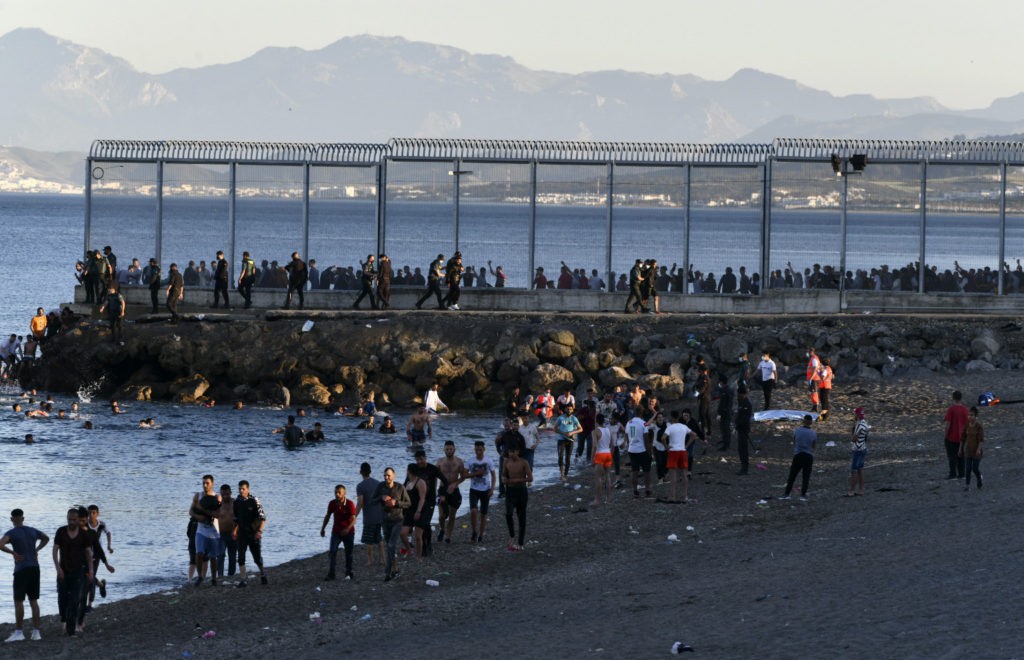
People from Morocco swim and walk into the Spanish territory at the border of Morocco and Spain, at the Spanish enclave of Ceuta on Monday, May 17, 2021. Authorities in Spain say that around 1,000 Moroccan migrants have crossed into Spanish territory (Antonio Sempere/Europa Press via AP)
Ceuta and Melilla have the European Union’s only land borders with Africa, making them popular entry points for migrants seeking a better life in Europe.
Mohamed Benaissa, the head of the North Observatory for Human Rights in the Fnideq, said the bulk of those making it to the Spanish side were “minors, youths but also families, all of them Moroccan”.
The wave of arrivals comes at a time of diplomatic tension between Madrid and Rabat, after it emerged that Polisario Front leader Brahim Ghali arrived in northern Spain in mid-April and is being treated in hospital for Covid-19.
The Polisario Front has long fought for the independence of Western Sahara, a former Spanish colony that is mainly under Moroccan control.
Analysts had warned the spat could threaten cooperation between Madrid and Rabat in the fight against illegal immigration.
Benaissa said Monday’s influx “could be linked to the diplomatic crisis between Morocco and Spain”.
But Spanish Foreign Minister Arancha Gonzalez Laya said Rabat had “assured” Madrid the huge influx was “not the result of the disagreement.”

A group of migrants celebrate as they walk towards a holding centre for migrants the Spanish North African enclave of Melilla, Spain, Tuesday May 18, 2021. A large group of Africans crossed into Melilla on the North African coast in the early hours by jumping over the enclave’s double fence. Spain said around 6,000 people had earlier crossed the border into Spain’s other North Africa enclave of Ceuta. (AP Photo/Javier Bernardo)
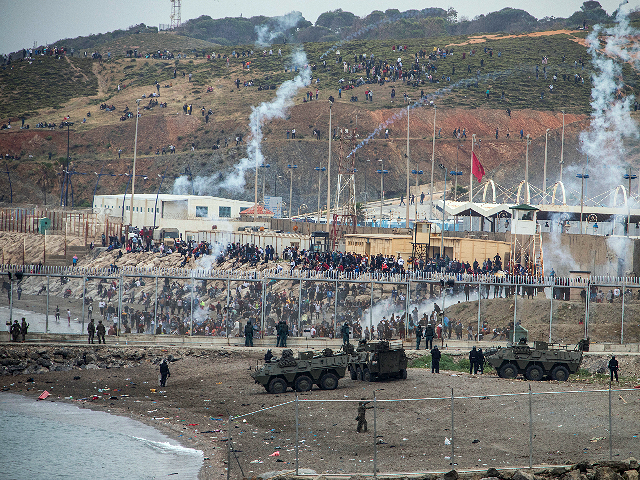
COMMENTS
Please let us know if you're having issues with commenting.